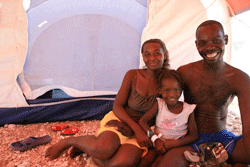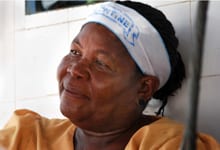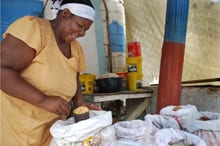Tens of thousands of people in Haiti were hit by flooding, landslides, and wind damage as tropical storm Isaac passed through the Caribbean country late Friday night.
[Read more…] about Tropical storm Isaac: Oxfam plans cholera prevention
Tens of thousands of people in Haiti were hit by flooding, landslides, and wind damage as tropical storm Isaac passed through the Caribbean country late Friday night.
[Read more…] about Tropical storm Isaac: Oxfam plans cholera prevention
Even before the devastating January 2010 earthquake, Haiti was one of the poorest and most food-insecure countries on earth. A majority of Haitians live in rural areas and depend on agricultural livelihoods, but neither the government nor the international community has paid sufficient attention to agriculture, leaving the countryside increasingly marginalized. Trade liberalization has exposed farmers to competition from subsidized US rice exports and made consumers vulnerable to volatile global food prices. Agriculture must have a central place in post-earthquake reconstruction, with an emphasis on improving small-scale farmers’ access to resources, so as to boost their incomes and productivity, particularly with regard to staple food crops.
 |
| Marceline, Sabine and David live in the Coraille resettlement camp outside earthquake-ravaged Port-au-Prince. Oxfam has provided shelter, water, latrines and food. Photo: Jane Beesley |
For the 5000 people now living in Coraille camp 15km outside Port-au-Prince, life is certainly more comfortable and easier than in the months after the earthquake. Oxfam and other NGOs are supporting the people in the camp with a range of basic services such as shelter, water, latrines and food. The camp is designated as a temporary relocation site, but nobody knows how long people will live here.
Marceline Philidor, her daughter Sabine and husband David were among the first people to be moved from the Petionville golf club, where they faced imminent threat of flash floods, to the Coraille resettlement site.
Marceline’s tent is one of many in a long row within the vast, sunbaked camp. She cooks rice on a small stove under the awning in front.
“Life is pretty much the same here now as when we moved in,” she says. “We have our tent. We have enough water from Oxfam to drink and cook and wash. We have the latrines from Oxfam – there are enough for everyone.”
Oxfam has known since the Coraille site was selected in April that the area is isolated and doesn’t have markets close by.
“I have done some work,” says Marceline, “digging the trenches for drainage here in the camp, making them deeper, so we will have a little money soon. I have been the one working because I had my identification with me when they offered the work. My husband goes out almost every day looking for work. Sometimes he takes the tap tap (colourful Haitian mini-bus) that goes from here to town. But we don’t have much money so often he has to walk.”
“I go to all the old places I used to work before the earthquake,” says David. “I was a metalworker and then a driver. When I have to walk I leave here at 4.30 in the morning and I usually get there around 11. A man shouldn’t stay at home. He should be able to go out and work to support his wife and child. But there are no jobs.”
Marceline would like to start a little business again, a market stall. “But I wouldn’t start it here; I would go to one of the markets nearby, in Bon Repos. People say they might create a new market there so people here can work. I don’t know if it’s true. We have been asking to have a market and a hospital and a school for the people living here in the camp.”
The school is an important topic to David. “Aside from getting work, our main priority is Sabine’s education. I don’t want my daughter to grow up sitting around here not learning anything. I want her to go to school and learn. There is a good school in Bon Repos. I would like to take her there, but we would need money. Like before the earthquake.”
 |
| For David and Marceline, Sabine’s education is a priority. But to send her to school they need work and income security for the long term. Photo: Kateryna Perus |
There isn’t much around their temporary home, just one or two little plants sheltered by the side of the tent. “I wouldn’t mind having a house here, maybe build my own,” David says. “We like it here. And we don’t want to go back to Port-au-Prince. It is too crowded and there are no homes there.
“We would like a little place to plant trees so that they could give us shade, and we could have mangoes to eat. And some space to keep chickens.”
“We need a real home. We need some privacy. We also need to be able to have fun sometimes, have some kind of recreation. Maybe watch the world cup on TV!”
“But we don’t know if there will be homes. There are rumours that they might be moving us again. So we don’t know.”
These families need – and have the right – to start earning a living again, to send their children to school, and to have a clear idea of when they will finally have a home again. The Government of Haiti, with the support of international and national organisations, has the responsibility to develop and implement a housing, resettlement and job creation strategy that will get people back into homes and communities and earning an income. This is the crucial next step toward helping Haitians rebuild their lives for the long term.
 |
| Oxfam helped women like Marie Carole Boursiquot run community canteens in the wake of the Haiti earthquake. Photo: Kateryna Perus |
Marie Carole Boursiquot was one of 56 women who ran Oxfam’s first community canteens in Port-au-Prince after the earthquake. Oxfam supported her financially so she could feed 80 of the most vulnerable people in her community and make a profit as a first step to regaining her own means of subsistence.
She operates a small market stall in a poor area of Port-au-Prince packed with buildings damaged by the earthquake. The gravel paths in the area are still covered with a thick layer of rubble.
“Things were difficult right after the earthquake, but we’re Haitian so we have to get up and move forward. The work at the community canteen really helped me; I was able to set some money aside to start my business back up. Now I have my own stall again.
“Every week while I ran the canteen I would put aside some of the profits and send the girls out to buy things for my shop. I also borrowed a little money so that I could buy the rest of the stock. Now I am selling all kinds of things: rice, sugar, beans, pasta, coal, shampoo…”
 |
| Using some of the profits she made running the community canteen, Marie Carole can again operate her small market stall. Photo: Kateryna Perus |
“I went all the way down to Croix Bossales to buy the stock at the market there. My brother helped me. With the canteen and now this stall at least we can all eat. Since the earthquake there have been ten of us living together in the same shelter with a metal roof. But now we have some plastic sheeting, some from Oxfam and some that we bought, so when it rains we don’t get wet like we did before.”
“People from Oxfam (the market support team) came to inspect the site of my old shop. They saw that it was destroyed and they are going to provide me with a shipping container that I can use as a shop and secure storeroom. That will be much better for my business; I will be able to buy more and I will be able to manage my stock better.
“Oxfam is the only organisation helping this whole community. Many things would help me, but I don’t want to ask for too much. You can’t constantly ask for others to give and give. I am satisfied with what God gives me. But, with more money or the container from Oxfam, I would be able to get on even better than now – expand my shop, sell more and make more money to improve our shelter and our life.
“There are always needs, but as long as we are healthy and we have two hands and two feet, we can find things to do. And we will continue living. Things will get better.”
Oxfam’s livelihoods work in Haiti supports people in regaining their means of subsistence and in taking charge of their own lives. Our livelihoods grant programme will reach 30,000 families, or roughly 150,000 people, over the next few months.
Elsie Delva is from Carrefour Feuilles, a poor neighbourhood of Port-au-Prince. She lost everything in the earthquake. Like thousands of other women and men who lost their livelihoods, she has the right to start rebuilding her life.